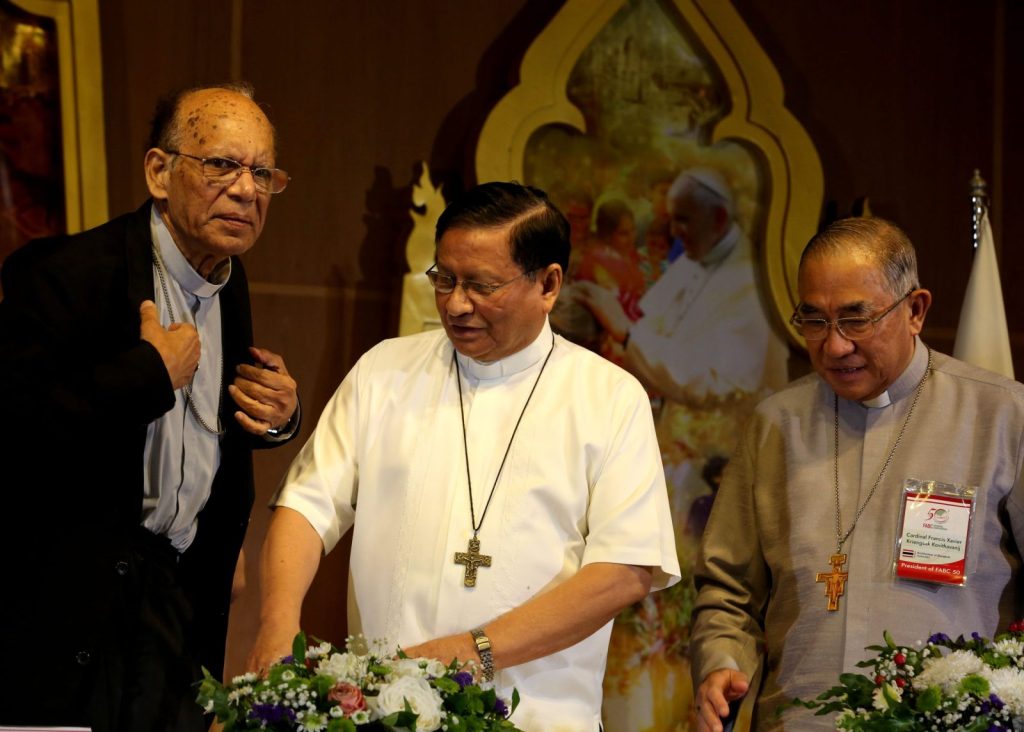Asian cardinals and bishops are set to respond to “emerging challenges” confronting the faithful, such as human rights and the climate crisis, this week at the end of the largest ever gathering of the region’s Church leaders.
“We identified some of the concerns … and then we had now the whole conference trying to respond,” said Cardinal Oswald Gracias of Bombay, convenor of this year’s Federation of Asian Bishops’ Conferences (FABC) meeting in Thailand.
The gathering, which aims to “reaffirm, renew and revitalize” the Catholic Church in Asia, is expected to come up with pastoral statements on religious, theological, spiritual, and institutional concerns.
“But there are many other issues also,” said Cardinal Gracias, responding to a question raised by LiCAS News during a media briefing on Monday, October 24.
“We are aware that it is the Church’s duty to protect human dignity, to promote justice … to work for peace, reconciliation, harmony,” he said, adding that the Church should be a “bridge builder.”
He noted that “in certain places” in Asia, “human rights have been trampled on.”
“In certain places, women are not given equal status, in certain places, the migrants are rejected, and in certain places, the indigenous people’s rights are not protected,” Cardinal Gracias said.
Cardinal Charles Maung Bo of Yangon, FABC president, said the conference brought Asia’s Church leaders together to see the “diversity, the suffering masses, (and) the challenges.”
“And at the same time, we have great graces received,” he added.
The cardinal from Myanmar said that during the discussions the bishops became “like Moses” in the Old Testament. “In front of us, Moses would say ‘How can this be? The burning bush.’”
“We, too, during days of days of meetings, we see the burning bush as exploitation, rivalry, economic holocaust, migration, war, man-made disasters, human-made disasters, and we say to the Lord, like Moses, ‘How can this be?’ But we have the assurance of the Lord, He will say, ‘I will be with you. With you in Asia,” said Cardinal Bo.
“We are not discouraged because although we are minority, our presence in the whole of Asia is very effective, and we are going through this journey with triple dialogue to the poor and with our culture and religions, and added to that, dialogue with nature,” he said.
Cardinal Gracias said that during the 18-day gathering, “the bishops … are reflecting how exactly we can promote human rights, how exactly we can promote human dignity, how exactly we can ensure justice, and peace, and reconciliation.”
The cardinal said the gathering reflected on “how we can make Asia a place that God wants it to be, how the Gospel values — justice, peace, love, unity, harmony — are promoted.”
“That’s our mission, that’s our task, that’s our calling, and we certainly will take it up,” he said.
Cardinal Gracias said the bishops attending this year’s gathering “were exposed” to reports from different countries “so that they would know the situation … to feel and identify what exactly are the problems.”
“The emerging trends are already here with us,” he said, enumerating various issues that the meeting are trying to address — “coming out of the pandemic, climate change, the question of the cry of the youth, of women, the questions of migrants, the questions of indigenous people.”
“Went deeper by having specific inputs … (so) that could understand more what exactly is the reality, what is the objective situation,” he said.
“We are in the process of identifying and trying to open ourselves to understand these priorities,” said Cardinal Gracias, adding that they “will come to the conclusions trying to see what is the way forward” and the Church would respond to the “challenges.”
He said the objective of the meeting “is really reflecting on the richness of Asia” and on what FABC has done “to see how we can go ahead.”
The cardinal said they try to discern “What priority should we have in the next few years, what should the Churches in Asia do, how should they guide themselves, guide the people.”
“We want to commit ourselves, the bishops of Asia, the FABC, to work for a better Asia, not only for a better Church, but for the better Asia all over,” he said.
The FABC general conference, which started on October 12 and ends on October 30, carries the theme “Journeying Together As Peoples of Asia.”
The FABC is a voluntary association of episcopal conferences in Asia that was established with the approval of the Holy See.
Its aim is to foster among its members solidarity and co-responsibility for the welfare of Church and society in Asia.
